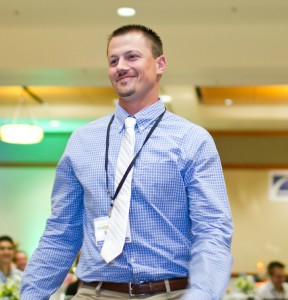The Arnie Wetherill Mentoring Experience
 by Matt Masullo, BRMP, Penn State University
by Matt Masullo, BRMP, Penn State University
On July 1st of this year, I embarked on yet another journey in my role as a BRM: the BRM Institute Mentor/Mentee program with my mentor, Arnie Wetherill. Since day one, it has been a blessing to have the opportunity to meet and learn from an established BRM who has been in practice for years, especially one who also happens to be the Vice-Chair of the BRM Council!
Above all, the mentoring relationship between Arnie and me is built on transparency and open communication. During our first interaction, Arnie and I both agreed that if and when difficult issues arise, they will not be a problem to discuss, as we both have learned to find comfort in discomfort. Our mutual ability to openly discuss issues that we’ve faced in our professional lives has been very beneficial to me, as getting honest feedback is crucial to success. Level-setting has also been integral to our mentoring relationship, and we prioritize honesty in all of our communications.
Moreover, all of our discussions occur within the “cone of silence” (a “Get Smart” 1960s TV reference), which means that what happens within our interactions stays between us. Every couple of weeks, we chat briefly about topics such as the role of the BRM as a Connector, Orchestrator, and Navigator, and each interaction manages to give me deeper insight into the roles and responsibilities of a BRM. As a result, I’ve learned to keep these roles in perspective when interacting with clients, as the BRM is not only the pilot in charge of getting everyone from point A to point B, but they are also tasked with keeping everyone calm during times of turbulence.
As the role and capability of BRM is a new development at Penn State University, Arnie has shared several golden nuggets to set me up for success in my role. Together, we have discussed critical BRM building blocks, like becoming a single point of focus and not a single point of contact, as well as soliciting buy-in and shared success through mutual agreement on capabilities, limitations, and constraints. These priorities have come as a bit of a cultural shock at my workplace (as I’m sure anyone who knows anything about cultural change can imagine), and admittedly there have been (and will continue to be) stumbling blocks as we move forward with our ITSM transition and BRM implementation. However, Arnie has helped to equip me with the tools needed to make this transition a positive one—some examples include using the House of BRM, understanding Organizational Change Management, helping to find organizational clarity, working to reasonably reset expectations, and sharing concerns with both the business and the provider, to name a few.
Having a mentor as I move forward in my BRM journey has been incredibly beneficial. Whenever I have a question, concern, or would just like to talk through something, Arnie is only an email, text message, or phone call away. Our discussions aren’t necessarily solely focused on BRM, either, as I partake in an Emerging Leaders program at Penn State, and leadership and BRM happen to be like peanut butter and jelly—you can’t have one without the other. As a BRM and leader, I’m hoping to spearhead new ways of thinking at Penn State with regards to understanding business capabilities, identifying organizational needs, and capitalizing on opportunities in a way that encourages business innovation and value realization. I’m confident that having a mentor and friend like Arnie as a resource will help me achieve these goals, as he has sailed this path before and will share advice and lessons learned from his experience to help me navigate potentially tricky waters. After taking so much from BRM Institute’s Mentor/Mentee program in only a few short months, I strongly encourage others to take part in the program as it moves forward.